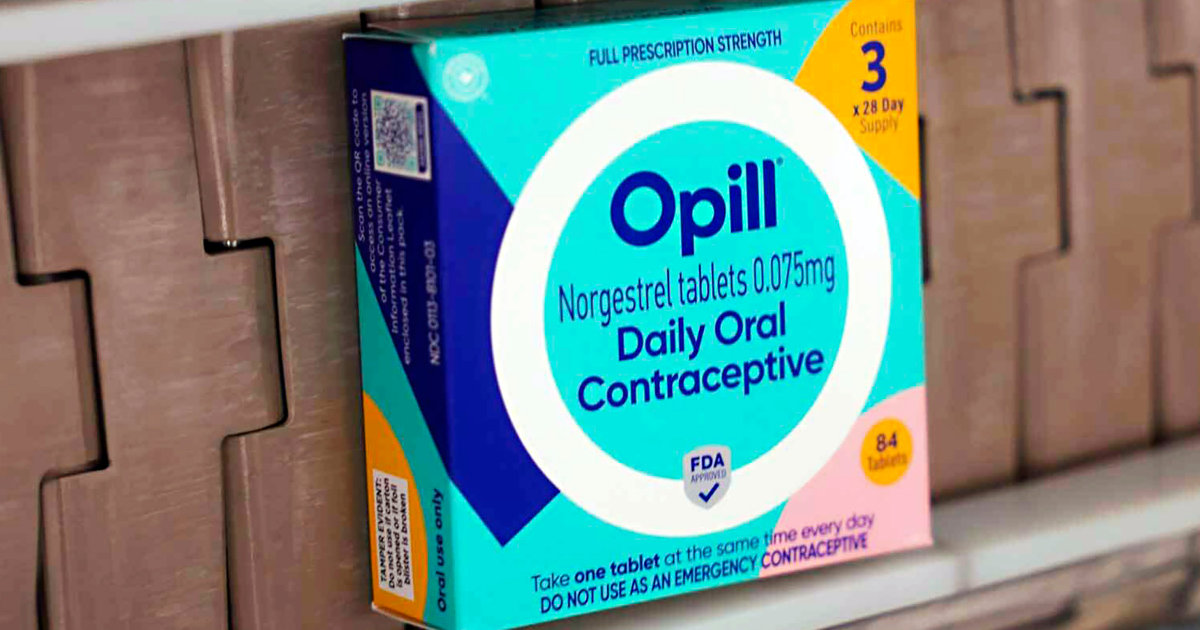
Opill, the first birth control pill approved to be sold without a prescription, has landed on shelves at some Walgreens stores.
The pill is also available to order online from Amazon, CVS, Walgreens and the Opill website.
It’s the first time that U.S. residents are able to buy birth control pills over the counter — the same way they would purchase Tylenol or Advil — though many states allow pharmacists to dispense birth control pills to patients without a prescription.
Sriha Srinivasan, 21, said she plans to start taking Opill as soon as she can find it at a store near her home in Fairfield, California — both for its convenience and because she wants to support a product that’s expanding access to contraception.
Srinivasan, a contraceptives activist, said she tried to schedule appointments at local clinics to get a birth control prescription last year, only to find out that the earliest slots were months away, during her final exams.
“That’s not access to me,” she said. “This is fulfilling the gap that I experienced, that I know for a fact that other students have also experienced.”
The Food and Drug Administration approved Opill for over-the-counter sales in July, but the drug’s maker, Perrigo, didn’t start shipping batches to retailers and pharmacies until March 4.
The Opill website shows a map of stores that carry or are expected to carry the pill.
Walgreens estimated that Opill would be at all of its stores within the next week or so. Several stores in Massachusetts and one in Connecticut confirmed to NBC News that the product had made it to shelves.
“Opill will be available at Walgreens nationwide in the family planning aisle and behind the pharmacy. Customers can also purchase the product online for 30-minute pickup, 1-hour delivery, or ship to home,” Marty Maloney, a company spokesperson, said in a statement.
Matt Blanchette, a CVS spokesperson, said the pharmacy chain started selling Opill online on Thursday, but the product hasn’t hit shelves yet.
“In early April, more than 7,500 CVS Pharmacy stores will offer Opill and for added privacy and convenience, customers will be able to choose same-day delivery or buy online and pick up in store,” he said.
Walmart spokesperson Tricia Moriarty said Opill is expected to be available on the store’s website at the end of this week, but as of Friday afternoon the pills were listed as “out of stock.” Opill will also be available at all Walmart stores the first week of April, Moriarty said.
The medication costs $19.99 for a one-month supply and $49.99 for a three-month supply at most stores, though Walmart lists slightly lower prices online.
Opill contains one hormone, progestin, which makes it harder for sperm to reach an egg, thins the lining of the uterus and can sometimes prevent ovulation. This type of birth control, known as the “mini pill,” is taken at the same time each day. The common prescription forms of birth control, known as “combination pills,” contain synthetic versions of both estrogen and progestin.
When used as directed, Opill’s effectiveness can be as high as 98%, meaning just 2 out of 100 women will become pregnant in a year of use. The effectiveness of combination pills can reach 99%.
A prescription version of Opill was approved more than 50 years ago under the brand name Ovrette, and was available in the U.S. from 1973 to 2005.
Over-the-counter birth control pills were already available in more than 100 countries before Opill was approved in the U.S. in July.
Srinivasan spoke about the need for over-the-counter birth control pills at an FDA advisory committee meeting last year.
“I really felt like I was the voice for a lot of young people in that moment. … I got a tattoo of a little birth control pack after I spoke to the FDA,” she said.
Srinivasan added, though, that she worries that even $20 per month might feel expensive after she starts medical school this fall.
Under the Affordable Care Act, most insurance plans are required to cover certain types of contraceptives at no out-of-pocket cost. But over-the-counter medications generally aren’t covered.
However, according to KFF, a nonprofit health think tank, seven states — California, Colorado, Maryland, New Jersey, New Mexico, New York and Washington — require private health insurance plans that are subject to state law to cover some nonprescription contraceptives. Many of those policies should be broad enough to include Opill, according to KFF — but the majority of plans are only subject to federal, not state, law. Seven states also have funds set aside to cover nonprescription contraceptives for Medicaid beneficiaries.






